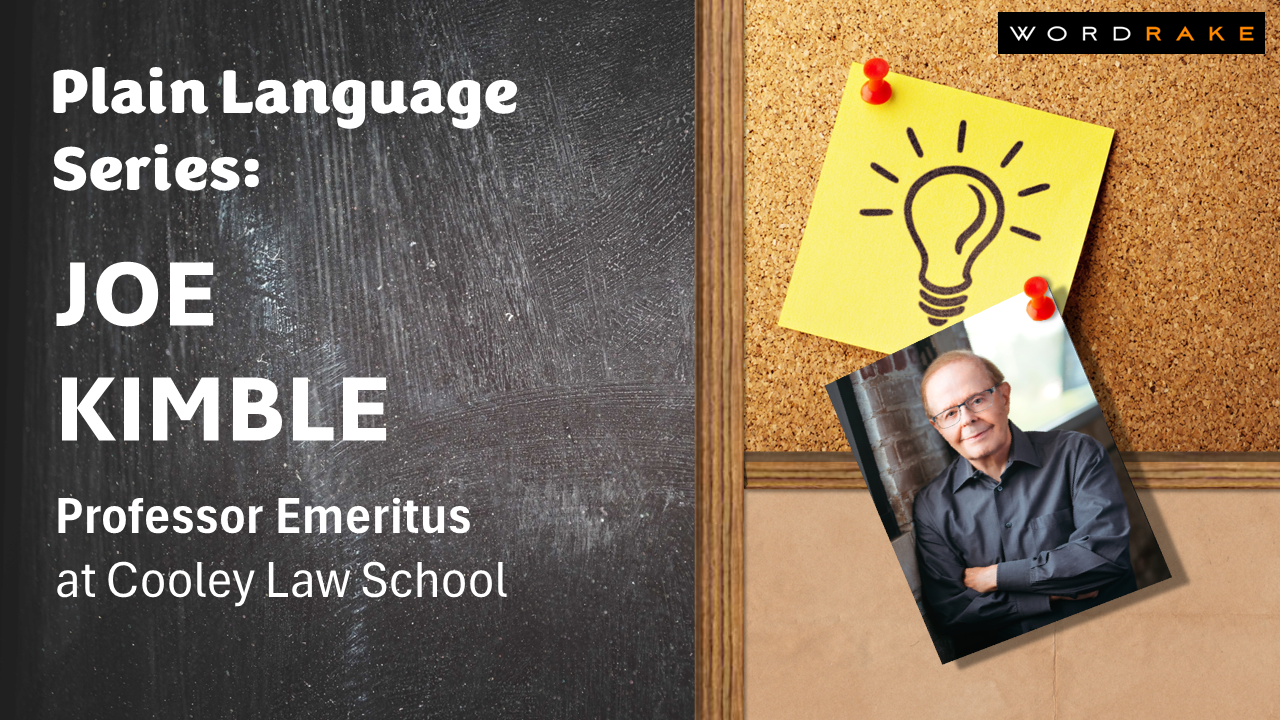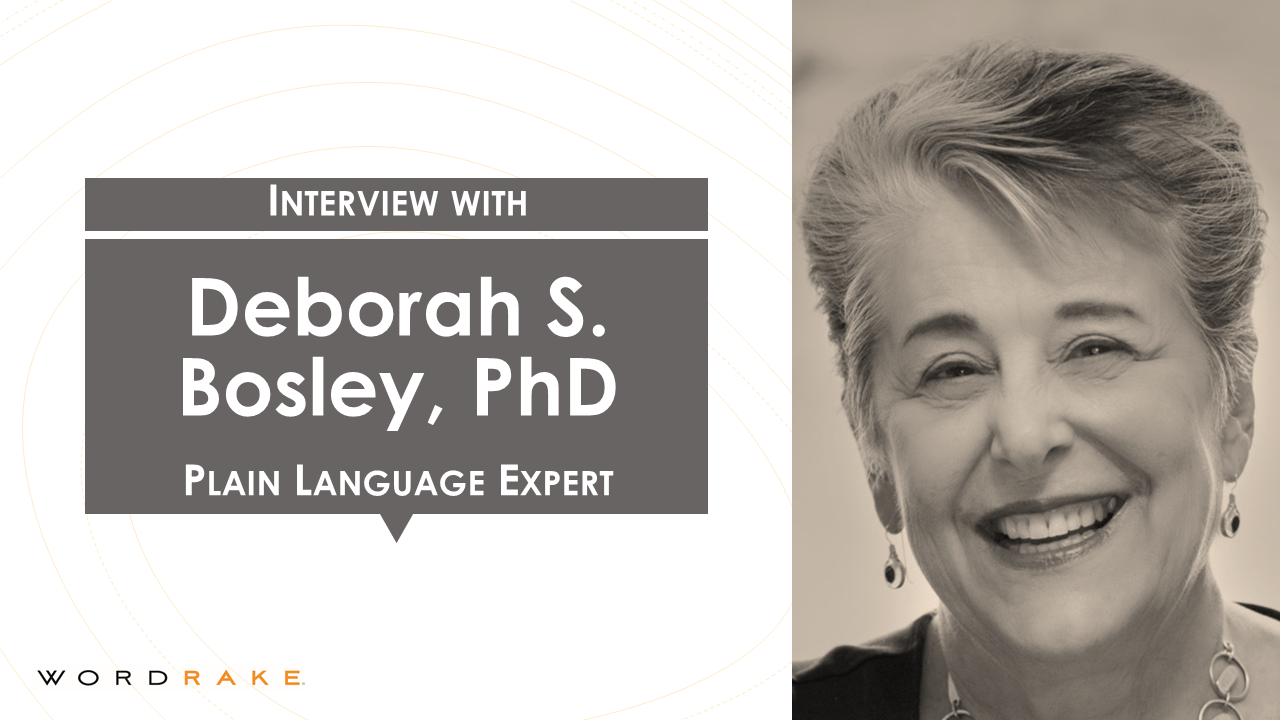There are many approaches to plain language, but one central goal: clear communication. Professor Joe Kimble was introduced to the basics of editing legal writing for plain language from a 1970's book and was hooked. Professor Kimble does not use editing software—he prefers direct human feedback for his own writing. In any case, we share something important: a passion for serving readers and consumers through clear communication.
You’ve spent most of your career teaching legal writing. What brought you to this field?
I tell this story in Part 1 of Writing for Dollars, Writing to Please: The Case for Plain Language in Business, Government, and Law. It never occurred to me during law school that anything was wrong with legal writing. And I was an English-lit major in college. Then in the mid-70s (ages ago), I was working on drafting court rules for the Michigan Supreme Court. I had no training for this during law school, so I went to the law library and discovered Reed Dickerson’s Fundamentals of Legal Drafting. I noticed several pages with a list of words and phrases on the left side under the heading “Instead of.” Then on the right side were the plainer, simpler equivalents. It finally started to dawn on me. Why pursuant to instead of under? Why prior to instead of before? And so on. I soon became a convert, although my education was just beginning.
By the way, a second edition of Writing for Dollars, Writing to Please will be out this year.
What prompted your interest in plain language?
At first, I thought legalese was just silly and unnecessary. Then I began to realize that it brings criticism—not to say ridicule—on the legal profession. And then I began to investigate the costs of poor legal and official writing, as well as the weak justifications for legalese. I’ll say more about those subjects in answer to your questions below.
How did you connect with other professionals and leaders interested in plain language?
It just happened gradually, as I began to write about plain language, give presentations and seminars, and attend conferences. And, of course, the Plain Language column in the Michigan Bar Journal—which I have been the editor of for 35 years—has a global reach and has connected me with leaders in the field from around the world. In fact, many of them have written for the column. A complete collection of columns going back to 1984 is available online here.
What is the difference between plain language and plain English?
“Plain language” is intended to incorporate languages besides English.
What are some factors that indicate a need to write in plain language?
All you have to do is look at a legal document or a printed form or notice from some business or from the government. Most of them, anyway. Or try to navigate most websites. When they are not user-friendly—when people cannot find the information they need, understand it, and use it—it drives them crazy. It’s frustrating and sometimes harmful. Think of medical instructions. Confusion can be dangerous.
Again, the costs of poor communication are almost incalculable, not just to users but to providers as well. For examples and data, see Writing for Dollars, Writing to Please. You’ll also find surveys of users confirming what I said above about their frustration and anger. And you’ll find dozens of empirical studies about the savings in time and money from using plain language.
How does plain language impact access to justice?
Simple: if people can’t understand their rights and obligations, how can they act on them?
Are there any common misconceptions around plain language? What do people misunderstand about the concept?
Several. One is that plain language means babytalk or a Dick-and-Jane style. I will say that advocates have been pretty successful in exploding that notion. I don’t see that charge as much as I used to (although it still bothers me when I see quotes around the terms plain language or plain English). Other misconceptions are harder to wipe out—like the notion that plain language is just about simple words and short sentences. Probably the biggest one is that legalese and officialese are needed for precision and accuracy. Actually, the reverse is true. Plain language lays bare all the confusion and uncertainty and ambiguity that dense prose tends to hide. Ask anybody who has been involved in a plain-language project. I’ve seen it time after time in my 20 years of redrafting new and amended U.S. federal court rules.
I have actually catalogued and addressed 30 flimsy claims for legalese and false criticisms of plain language in volume 19 of The Scribes Journal of Legal Writing.
Many law students and lawyers feel the need to prove themselves with their writing. What advice do you have for people who might think plain language won’t help them do that?
They only need to look at the studies of the kind of writing that judges and lawyers prefer. They overwhelmingly prefer plain language. Multiple studies show this. Of course, the great irony is that most judges and lawyers don’t practice what they preach (or prefer). And I’m afraid that a great many of them lack the skill that it takes. Writing plainly only looks easy. It takes training, reading, practice, and a willingness to seek out critique.
Beyond writing with simpler words and shorter sentences, what else can professionals do to communicate better for the public’s benefit? Share something fun about your work in legal writing and plain language.
They can learn the full range of plain-language principles, guidelines, and techniques. Dozens of them, ranging over design, organization, sentences, and words—and always keeping in mind the most fundamental one: write in a way that best serves your reader. In my work on redrafting the (U.S.) Federal Rules of Civil Procedure, Evidence, and Bankruptcy Procedure, I think the single biggest improvement we made is creating far more structural divisions (subparts), headings, and vertical lists. Obviously, this goes beyond simpler words and shorter sentences.
You’ve written several books about plain language, including one for children. Tell us about the book, your goals for writing it, and its reception so far.
Ah yes: Mr. Mouthful Learns His Lesson, about a fancy talker who, when faced with an emergency, saves the day by speaking plainly. You can see the connection with my work, but I did it mostly for fun. I’ve gotten a great kick from going into elementary schools and talking to kids about writing and words. And a new one, Mr. Mouthful and the Monkeynappers, will be available soon.
What are some of the most hopeful parts of the plain language movement? Do you see any trends favoring adoption or changes to how professionals learn to write?
Change is gradual, but it’s happening throughout much of the world. The ISO Standard is just one prominent example. For 49 more examples, see Part 4 of Writing for Dollars, Writing to Please (second edition). Plain language is on the minds of professional writers these days—more than in decades past—even if some of them are not yet successfully practicing it. Sometimes, of course, they meet resistance from supervisors. But I regularly hear from new people and new groups who are taking up our good cause.
How do you prefer to write? Do you use editing software or human editors, apart from yourself, while refining your work?
I use human editors.
About Joe Kimble
Joe Kimble taught legal writing and legal drafting for more than 30 years at Thomas Cooley Law School. He has written three books (four if you include Mr. Mouthful Learns His Lesson) and more than 100 articles and columns. He has spoken throughout the United States and around the world. He has been the editor of the “Plain Language” column in the Michigan Bar Journal for 35 years, the editor of the “Redlines” column in the Judicature journal, and a senior editor of The Scribes Journal of Legal Writing. He is a co-founder of the Center for Plain Language and the former president of Clarity—an international association promoting plain legal language. And Joe is a drafting consultant on all new and amended federal court rules. He has been honored with several national and international awards. You can find him on LinkedIn and Twitter.
About WordRake and International Plain Language Day
Plain Language experts Cheryl Stephens and Kate Harrison Whiteside created International Plain Language Day on October 13, 2011 to celebrate the first anniversary of the signing of the Plain Language Act in the United States. Since then, plain language enthusiasts take time each year to celebrate the gains the movement has made.
In October 2022, WordRake celebrated Plain Language Day by releasing their new Simplicity editing mode to help comply with plain language laws. As firm believers in the importance of clear communication, WordRake celebrates October 13th by highlighting experts and leaders in the plain language field. To see how WordRake can help you simplify your writing, take a 7-day free trial today!






